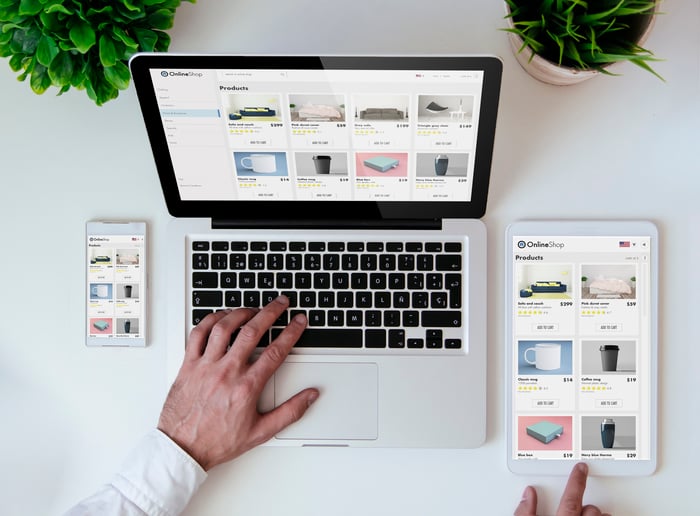The COVID-19 pandemic has had a profound impact on the way people live their lives. One of the most obvious changes is that it has accelerated our shift toward e-commerce, as many of us chose to forego in-person shopping at retail stores in order to lower our chances of contracting the coronavirus.
That's a natural caution, but even in light of that, the size of the boost this trend has gotten has been staggering. In April and May alone, the amount of money spent on online purchases exceeded the amount shoppers spent online during the entire 2019 holiday shopping season, according to a recent report by Adobe Analytics. The May 2020 Digital Economy Index, which tracks the state of e-commerce, found that consumers spent over $153 billion online during those two months, 7% more than in November and December 2019. Spending in May alone surged 78% year over year.
This points to further gains for companies leading the online revolution. Here are three that will most likely benefit.

Image source: Getty Images.
Amazon: The undisputed e-commerce leader
There's no doubt that Amazon (AMZN -2.77%) is well-positioned to benefit from the accelerating adoption of e-commerce. During the first quarter, the company reported revenue of $75.5 billion, up 26% year over year, the fastest pace of growth the company has seen since the third quarter of 2018. Profits also got a boost, with operating income of more than $4 billion and profits of $2.5 billion.
Amazon plans to spend heavily on protecting its employees and customers from exposure to COVID-19, investing in personal protective equipment, enhanced cleaning procedures, and employee testing. These steps are expected to cost it $4 billion in the short term, but should allow Amazon to continue its frantic growth in the e-commerce market.
Shopify: Helping merchants make the move to online sales
Shopify (SHOP -2.05%) specializes in facilitating other companies' expansion into e-commerce. Many small- and medium-sized businesses were caught off-guard when states implemented shutdowns of all but essential services in response to the rising pandemic. Companies that had long resisted selling their wares online were forced to set up digital shops in order to survive, and Shopify was there to answer their call.
The company helped thousands of new clients to move online, and by mid-April, Shopify was experiencing "Black Friday level traffic every day!" according to Chief Technology Officer Jean-Michel Lemieux. The strength of the company's business was reaffirmed when Shopify reported its first-quarter results just three weeks later. Revenue grew 47% year over year, on pace with growth it achieved during the holiday quarter, while subscription jumped 34%. This resulted in adjusted net income that tripled year over year
There's every reason to believe that Shopify's strong results continued into the current quarter, and that it will benefit from this acceleration for years to come.

Image source: Getty Images.
Target: Hitting the online shopping bullseye
Retail giant Target (TGT -0.53%) was particularly well-positioned to benefit from the shift to e-commerce due to its longtime omnichannel approach. In recent months, many shoppers have taken advantage of the company's same-day services, which allow people to shop online and pick up their orders either in the stores or in their parking lots, or have them delivered to their homes.
Some of Target's first-quarter metrics were truly astonishing. Total revenue grew 11% year over year, while comparable-store sales climbed 10.8%. When looking strictly at digital sales, comparable sales jumped 141%, while same-day sales soared 278%.
Target also said it saw market-share gains across all five of its core merchandise categories, which bodes well for its future.
More e-commerce winners are out there
This list is not meant to be exhaustive, but does illustrate some of the players that are best-positioned to continue to benefit from the move to e-commerce. John Copeland, Adobe's VP of customer and marketing insights, said he believes the accelerated adoption of e-commerce will continue. "COVID-19 has changed business forever. We think that over the next couple of months we will see an even bigger focus on experience-driven e-commerce, as the competition heats up where consumers are now putting so much of their attention online," he said.





